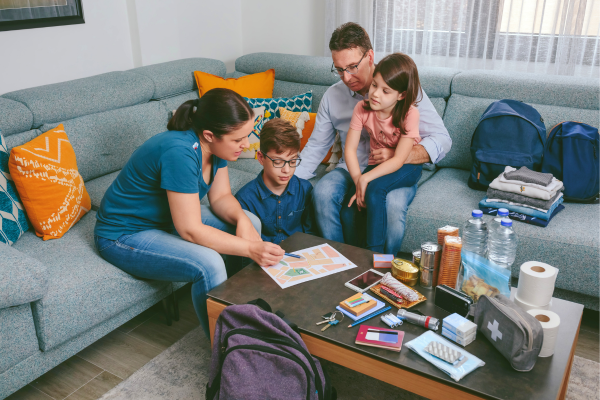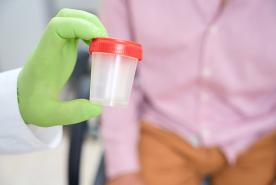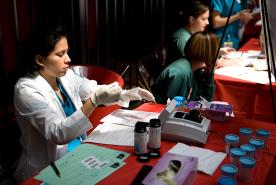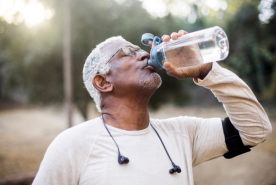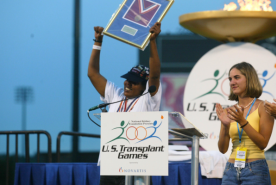December 18, 2024
Emergencies and natural disasters can strike at any time. If you have kidney disease, are on dialysis, or have a kidney transplant, being prepared isn't just important—it's essential. Learn how to stay ahead of the unexpected with tips from emergency preparedness expert Keeley Lenoir, Program Manager for the Kidney Community Emergency Response Program.
Key Takeaways
Key Takeaways
Pack a Go-Bag
Build an emergency kit with essentials like a flashlight, batteries, three days' worth of water and food, medications, records, and ID.
Make a Plan
Write down your plan down and share with care partners, family, or friends. Include contacts for backup healthcare centers and dialysis clinics.
Tailor Your Plan
Prepare for disasters specific to your area, like wildfires, hurricanes, tornadoes, blizzards, or extreme heat.
All Hazards Preparedness
Save and listen to the episode later.
No matter the emergency, it is important to be ready.
"I teach all hazards preparedness, a comprehensive approach to planning for all emergencies and disasters–meaning we don’t create plans for each type of disaster or emergency," Lenoir said. “Start by building an emergency kit or a go-bag.”
Lenoir recommends packing:
- A flashlight and extra batteries
- A battery-powered or crank radio
- Three days' worth of water
- Three days worth of kidney-friendly non-perishable food
- Prescription medications and any medical devices you need
- Copies of medical records, like dialysis treatment orders or recent lab results
- Necessary paperwork, like ID and insurance cards
- Change of clothes
- First aid kit
"It's a good idea to put your go-bag in an easily transportable container," Lenoir said. "Maybe a rolling suitcase or one of those plastic totes with wheels–anything you can grab and throw into your car quickly."
And, remember to check your supplies regularly.
"Pay attention to expiration dates, especially for water and batteries," said Lenoir. "Mark your calendar with expiration dates and replace items that have gone bad.”
Subscribe today!
Join the NKF Blog Newsletter
Get inspirational stories and kidney disease resources delivered to your inbox every month. You'll gain practical insights and expert advice to help you better understand and manage your kidney health no matter where you are on your kidney journey.
Make a Plan
With your go-bag ready, develop an emergency plan and write it down.
“I encourage patients to get care partners, family, or friends involved,” said Lenoir. “Share the plan with them. They can also help you prepare or assist after an emergency."
Some of the most common issues to prepare for include power outages, water shortages, and disruptions to public transportation.
Power Outages
If possible, people on dialysis, especially home hemodialysis, should consider buying a small portable generator or backup battery system.
"Purchasing these items may not be an option for everyone," Lenoir said. "Whether you have a generator or not, ask your clinic about backup healthcare centers. Write the names and numbers down. Keep them in your go-bag for future reference."
You should also charge your phone at any sign of a power outage. Since you may not have a warning, keep a fully charged portable battery on hand.
"They're available in most stores and aren't super expensive. Access to a phone after an emergency is critical," said Lenoir. "Dialysis providers may try to contact you from numbers you don't recognize. Make sure your voicemail is set up and check regularly for missed communication."
The last thing to consider is medication storage. Some medications, like insulin, need refrigeration. Keep them cool with ice packs or a cooler if the power is out.
Water Outages
Immediately contact your dialysis clinic during a water outage. They may have backup plans, instructions on how to proceed, or advise you to visit an alternate facility for treatment. Ensure you have your dialysis treatment orders and documents in your emergency kit.
You can also contact local authorities for water distribution points in your area.
Public Transportation Disruptions
If you rely on public transportation to get to treatments, plan alternate ways to travel. Tornadoes, hurricanes, or snowstorms can shut down public transit.
This is where care partners, friends, and family may be helpful. You can also ask your care provider or a local librarian about backup transportation resources available in your area.
Types of Disasters
Now that you have an all-hazards preparedness plan, focus on the types of emergencies most likely to happen in your area. Add to your plan if necessary.
Here's a quick look at common emergencies and tips on how to prepare.
Wildfires
If you live in an area at risk for wildfires, keep N95 masks and HEPA filters at home to protect yourself from poor air quality. Know your evacuation routes and have transportation plans ready.
Hurricanes
Evacuation planning is key. If you're on dialysis, talk to your clinic ahead of time about where you can go for treatment if you have to evacuate. Pack waterproof bags for your medications and other items like your dialysis treatment orders.
Tornadoes
Know where to take shelter in the event of a tornado and have a backup plan for getting your dialysis or medical treatments. It's likely roads and some dialysis centers will close.
Ask your provider what to do if your usual clinic is closed.
Blizzards
Be ready for power outages. Stock up on warm clothing, blankets, and extra batteries for flashlights. If possible, dialysis patients should plan additional treatment sessions in advance, as travel may become difficult in heavy snow.
Extreme Heat
In regions with extreme heat, staying hydrated is crucial. Dialysis patients with fluid restrictions should ask their doctor how much fluid they can safely drink in extreme heat. Make sure your medications are stored properly, as high temperatures can affect their effectiveness.
NKF Cares
Preparing for emergencies can seem overwhelming, but you don't have to do it alone. With a bit of planning, you and your loved ones can stay safe and ready for anything. For support, call NKF Cares toll-free at 855.NKF.CARES (855.653.2273) or email nkfcares@kidney.org.
